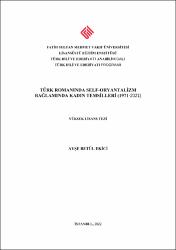| dc.contributor.advisor | Danış, Zeynep Kevser Şerefoğlu | |
| dc.contributor.author | Ekici, Ayşe Betül | |
| dc.date.accessioned | 2023-04-10T06:41:39Z | |
| dc.date.available | 2023-04-10T06:41:39Z | |
| dc.date.issued | 2022 | en_US |
| dc.identifier.citation | EKİCİ, Ayşe Betül, Türk Romanında Self-Oryantalizm Bağlamında Kadın Temsilleri (1971-2021), Fatih Sultan Mehmet Vakıf Üniversitesi Lisansüstü Eğitim Enstitüsü Türk Dili ve Edebiyatı Anabilim Dalı Türk Dili ve Edebiyatı Programı,Yayımlanmamış Yüksek Lisans Tezi, İstanbul 2022. | en_US |
| dc.identifier.uri | https://hdl.handle.net/11352/4488 | |
| dc.description.abstract | Batılı eril gözün merkeze alınması suretiyle Batılı ‘ben’/Doğulu ‘öteki’ şeklinde bir diyalektikle kodlanan oryantalist söylem, zaman zaman bir Doğulu tarafından Batılı gözle yeniden üretilerek self-oryantalist bir tutum meydana getirir. Edebi eser ise self-oryantalist söylem üretimi için önemli bir zemin oluşturur. Bu bağlamda ilk örneklerinden günümüze uzanan süreç içerisinde Türk romanında bazı eserlerin Doğu’ya ilişkin oryantalist temsil biçimlerini tekrar ederek ve çeşitlendirerek self-oryantalist bir tutumla kaleme alındığı söylenebilir. Bu temsil biçimlerinin başında kadın temsilleri gelmektedir. Oryantalizmin, gücünü cinsel farktan alan ve eril gözün kurguladığı bir temelden inşa edilen yapısı göz önüne alındığında self-oryantalist söylemlerin de Doğu’ya ve Doğulu kadına ilişkin oryantalist söylemlerden ayrı düşünülemeyeceği görülmektedir.
Bu çalışmada ise Türk romanında 1971’den 2021’e kadar kaleme alınan 25 eser incelenerek; Doğu-Batı ikiliği çerçevesinde neyin ‘ben’, neyin ‘öteki’ olarak kurgulandığı üzerinde düşünülmüş ve self-oryantalist bağlamda üretilen kadın temsilleri odağa alınmıştır. Şehevi, egzotik, Müslüman, başörtülü, peçeli, taşralı, aydın/kentli kadın temsilleri gibi çeşitli başlıklar altında söz konusu seçkide tespit edilen temsil şekilleri tartışmaya açılmış ve bunların altında yatan self-oryantalist tutum ortaya konulmaya çalışılmıştır. Bu çalışmada cinsel fark, oryantalizmin ve self-oryantalizmin kurucu bir işlevi olarak ele alınmıştır. Belirtilen dönemlerde yazılan romanlardaki cinsel farka, kadın temsillerine ve self-oryantalizme konsantre olunarak bu temsillerin günlük hayata yansıyışı ve üretmiş olduğu kimlikler ortaya konmaya çalışılmıştır.Oryantalizmin kurucu işlevi olması bakımından cinsel fark meselesinin kadın temsillerine konsantre olunarak ele alınması ve bunun self-oryantalist tutum bağlamında Türk romanı merkeze alınarak irdelenmesi üretilen kadın temsillerinin günlük hayata yansıyışı ve üretmiş olduğu kimlik kodlamalarını ortaya koyması bakımından önemlidir. | en_US |
| dc.description.abstract | The orientalist discourse, which is encoded with a dialectic of the Western 'self'/Eastern 'other' by moving the Western masculine eye in the center, from time to time creates a self-orientalist attitude being reproduced by an Eastern with a Western eye. Literary work, on the other hand, forms an important basis for the production of self-orientalist discourse. In this context, it can be said that some works in the Turkish novels were written with a self-orientalist attitude by repeating and diversifying the orientalist representations related the East, from the first examples to the present. Representations of women are leading these forms of representations. Considering the structure of orientalism, which gets its strength from the sexual difference and being built from a foundation constructed by the masculine eye, it is seen that self-orientalist discourses cannot be considered separately from orientalist discourses related to East and Eastern women.
In this study, 25 works written in Turkish novels from 1971 to 2021 were examined; within the framework of the East-West dichotomy, has been considered to what is fictionalised as 'self' compared to what is 'other' and the female representations produced in a self-orientalist context have been addressed. The representations identified in the aforesaid selection were discussed under various titles such as the representations of lustful, exotic, Muslim, headscarved, veiled, rural, intellectual/urban women, and the underlying self-orientalist attitude was tried to be revealed. In this study, sexual difference is considered as a founding function of orientalism and self-orientalism. Concentrating on the sexual difference, female representations and self-orientalism in the novels written in the stated periods, the reflection of these representations in daily life and the identities they produced were tried to be determined.
In terms of being the founding function of orientalism, addressing the issue of sexual difference by focusing on women's representations and examining it by focusing on the Turkish novel in the context of a self-orientalist attitude is important in terms of revealing the reflection of women's representations on daily life and the identity code they produce. | en_US |
| dc.language.iso | tur | en_US |
| dc.publisher | Fatih Sultan Mehmet Vakıf Üniversitesi, Lisansüstü Eğitim Enstitüsü | en_US |
| dc.rights | info:eu-repo/semantics/openAccess | en_US |
| dc.subject | Oryantalizm | en_US |
| dc.subject | Self-Oryantalizm | en_US |
| dc.subject | Kadın Temsilleri | en_US |
| dc.subject | Türk Romanı | en_US |
| dc.subject | Oryantalist Söylem | en_US |
| dc.subject | Cinsel Fark | en_US |
| dc.subject | Orientalism | en_US |
| dc.subject | Self-Orientalism | en_US |
| dc.subject | Representations of Women | en_US |
| dc.subject | Turkish Novel | en_US |
| dc.subject | Orientalist Discourse | en_US |
| dc.subject | Sexual Difference | en_US |
| dc.title | Türk Romanında Self-Oryantalizm Bağlamında Kadın Temsilleri (1971-2021) | en_US |
| dc.title.alternative | Representations of Women in the Context of Self-Orientalism in Turkish Novel (1971-2021) | en_US |
| dc.type | masterThesis | en_US |
| dc.contributor.department | FSM Vakıf Üniversitesi, Lisansüstü Eğitim Enstitüsü, Türk Dili Ve Edebiyatı Ana Bilim Dalı | en_US |
| dc.relation.publicationcategory | Tez | en_US |
| dc.contributor.institutionauthor | Ekici, Ayşe Betül | |



















